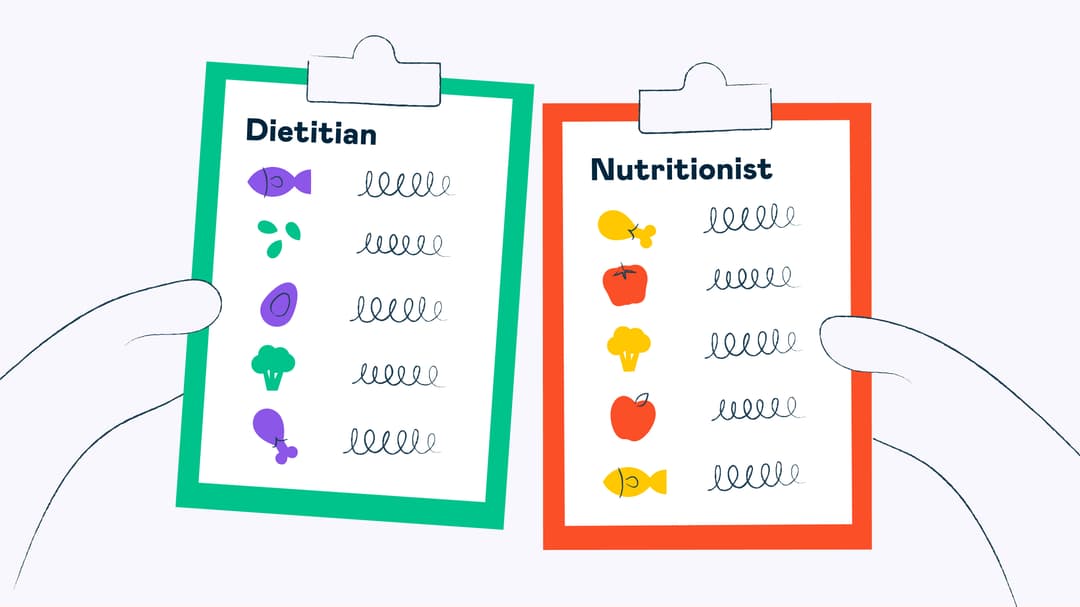All Categories
Featured
Table of Contents
-1
And if you 'd such as to get involved in the food and nourishment market, it deserves understanding what those differences are now. This fast breakdown must give you an excellent idea. Dietitians aid their customers navigate the link between food and health. They do this by translating the most up to date scientific and clinical research right into useful advice that individuals can use to their lives.
-1Nutritional experts generally work in group settings, informing wider communities and organisations. They can likewise work in other areas such as: Review plans and laws around foods, including high quality checks. Guarantee that food is generated to satisfy food security standards. Create programs and treatments to assist the wider public address food concerns.
-1The major difference to comprehend is that the nutrition occupation isn't managed in Australia. This indicates that practically, anybody can call themselves a 'nutritional expert', while you must have an authorized dietetics certification to be a dietitian. To shield properly practicing nutritional experts, the Nourishment Culture of Australia has a Register of Nutritionists.
-1The average wage for a nutritionist is $75,000 per year. This can vary from $60,000 to $90,000, depending on the function.
Functional Dietitian
-1Study a degree in nutrition. A profession as a dietitian might be best for you.

-1
Dietitian and nutritionist: both of these careers function around diet and food, however are they the very same? While they overlap in some ways, these tasks are actually rather various. So exactly what is the difference in between a dietitian and a nutritional expert? The short response is that a dietitian works in a controlled area, and should have finished a bachelor's level.
-1Despite the distinctions in qualifications between a dietitian versus nutritional expert, the incomes are quite comparable. While there is a higher demand for qualified dietitians, nutritional experts often tend to have higher job satisfaction - Weight Loss Dietitian.
Plant-based Nutritionist – Bridgetown
-1You can operate in a substantial variety of markets for a variety of organisations or perhaps for on your own. If you're still uncertain concerning whether to come to be a dietitian versus a nutritionist, the following may aid you choose. As a dietitian, you might take pleasure in a profession as a: a registered dietitian or dietitian nutritionist is a person who operates in the basic location of dietetics, suggesting diets, supplements and dietary help to sustain healthy way of livings and illness administration.
-1To end up being country wide certified, dietiticians need to sign up with the Accredited Practising Dietitian (APD) program and become a member of Dietitians Australia. Whether dietitian or nutritionist is a much better occupation for you far better depends on your individual preferences. It is very important to note that all dietitians are nutritionists, yet not all nutritionists are dietitians.
Dietitian For Diabetes Type 2
-1Both occupations are entailed with assisting individuals accomplish their wellness objectives with food education, however there are lots of elements that establish them apart. If you want advising individuals on nutritional and nutritional issues, you might have what it takes to end up being a nutritionist or diet professional. The field of food scientific research is extremely broad, supplying a variety of career chances to certified experts.
-1Nutritionists specialise in giving evidence-based advice and services associated with nourishment. Via normal appointments, nutritional experts help clients understand the web link in between diet and health so they can make even more informed choices around food and live a much healthier way of living. Nutritionists typically deal with customers on a private basis, although they likewise collaborate with teams with a details objective (e.g.
Personal Dietitian – Bridgetown
-1Also though you don't need to study to become a nutritionist, doing so might boost your chances of advancing your profession in this area. Programs that have a specialized in Nutrition, like the HLT43015 Certification IV in Allied Health Assistance (Nourishment and Dietetics Expertise), are developed to create your understanding of the partnership in between food and health and wellness, enabling you to offer expert advice on nutrition.
Personalised Nutritional Advice – Bridgetown
-1Jul 09, 2018 Australia presently does not manage the specialist titles 'nutritional expert' or 'dietitian', leaving a wide market for misinformation if you do refrain from doing your own study. The media additionally often tends to utilize both terms mutually, making distinctions between credentials significantly tough. Continue reading as we damage down the distinctions between these professions, their pertinent certifications, what they can do for you and what to try to find when trying to find a professional to assist you.
-1You have actually made a decision that you require to boost your health and that working on your diet is the ideal location to begin. You have actually listened to concerning the advantages of dealing with a dietitian or a nutritionist, however you aren't sure which you require or exactly how to choose who to work with.

-1
Nevertheless, the major differences are the sort of study that has been finished by each professional, and the regulations connected to each title. A dietitian has fulfilled the nationwide and global criteria for specialist regulations. Dietitians are the only nourishment specialists to be controlled by law, and they are regulated by an ethical code (just like medical professionals are) to make sure that they constantly function to the greatest requirement.
-1On the various other hand, someone who has the title of a nutritional expert is not safeguarded by legislation in many nations, and it is not a regulated term. All dietitians are taken into consideration to be nutritional experts; nonetheless, nutritionists without a dietetics credentials can not tackle the been experts role of a dietitian. For somebody to come to be a registered dietitian, they need to have completed a 4 year college degree in Nourishment and Dietetics, or a 3-year science degree complied with by a Masters Degree in Nourishment.
Local Dietitian – Bridgetown-Greenbushes

-1
Since all of this info has been supplied, we can reroute our focus to the opposing end of this dietician vs nutritionist dispute. On an alternative degree when going over 'what is the distinction between a diet professional and a nutritionist?', we can claim the functions do not differ hugely. Dietitians will still arrange food and nourishment strategies, in order to promote a healthy way of life among their customers.
-1For example, dieticians can also operate in educational establishments such as Universities. In comparison to this, the largest difference between a nutritional expert and dietitians in the UK is that nutritional experts to function in clinical markets. Private Practice Dietitian. Rather, they can work within the health and wellness market in functions such as dietary experts in food circulation business, in addition to an individual fitness instructor that gives guidance and referrals to their clients
-1This brings us on to discussing the following difference in between a diet professional and nutritionist in the UK. You may have reviewed this heading and questioned 'exists a distinction between a dietician and a nutritional experts' customers?'. It's only natural to think that anybody going to either professional will be doing so for comparable reasons, but this is not the instance.
Latest Posts
Acknowledgement & Inclusivity - Perth – Wanneroo 6065
Dietwise.net.au - Our Blog (Golden Bay )
Tips To Find The Right Dietitian To Work With